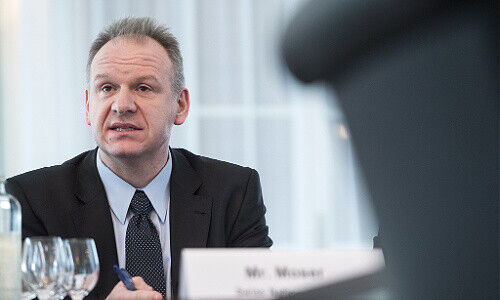Project «Helvetia» is a joint project with SIX/SDX and the Swiss center of the BIS Innovation Hub in Basel. The Swiss center comprises a total of 8 employees, 5 of whom are delegated by us. Furthermore, we have employed a person who is responsible for the coordination between the center and the SNB, and there are also a number of employees spread throughout the bank who devote part of their working time to this topic.
Of course, we also participate in international working groups and benefit greatly from cooperation with other central banks and companies. We share resources and the knowledge we gain.
Would you appreciate it if, for example, the Swedes launched an e-krona?
It would certainly be interesting to see a larger country launch such a project.
The SNB has so far emphasized that it rejects the introduction of a digital currency for consumers because it would endanger the proven two-tier banking system. Isn't this system being called into question by the active fintech scene anyway?
Of course, there are new challenges for our banks, but we fundamentally welcome competition. Don't underestimate the banks! There is a consortium of banks behind enterprise blockchains, such as Corda. Banks are experiencing pressure, but they are also adapting. Banks can commercialize blockchain technology themselves relatively quickly.
How do you personally see the role of the private sector and that of the state in the further development of the financial center?
The state and the private sector have always worked hand in hand in the provision of money. Companies compete with each other, they have to look for new solutions and satisfy customer needs. The private sector has therefore often contributed the innovations.
«The private sector keeps coming up with new innovative ideas»
Even banknotes were originally issued by banks. At some point, problems arose because it became confusing and because there were reputable and less reputable issuers. Consumers suffered losses, and cash issuance began to be regulated. Eventually, banknotes were nationalized, including in Switzerland, and the SNB was created as a central bank.
What about the new cryptocurrencies? There is still little regulation there.
That is likely to change, and the development of stablecoins could be similar to that of banknotes. In an initial phase, stablecoins are issued freely, but as soon as users lose money with them, the call for regulation comes up and regulations are demanded as to how strongly the coins must be backed.
«Many people thought before the introduction of the euro that the franc could disappear»
The private sector keeps coming up with new innovative ideas. The state looks to make them more secure. Our position is that the same services should be regulated the same way, regardless of who provides them.
Couldn't this system be undermined by large multinational companies launching their own currencies?
From the basic concept, currency competition is not entirely new, even among government-issued currencies – think of the euro. Before the introduction of the euro, many people thought that the franc could disappear. Even then, I took the view that as long as the SNB did its job well and kept the value of the franc stable, there was little incentive for people to change. With Diem (formerly Libra), I think it would be similar. As long as the SNB takes care of the franc, a currency issued by a multinational company will not seriously threaten the Swiss currency domestically.
Thomas Moser has been an alternate member of the governing board of the Swiss National Bank (SNB) since the beginning of 2010. He is responsible for the operational management of the Money Market and Foreign Exchange, Asset Management, Banking Operations, and Information Technology divisions, as well as for the Financial Market Analysis unit and the Singapore branch office.
Moser is a member of the managing committee of the Swiss Institute of Banking and Finance at the University of St Gallen and a member of the advisory board of the Swiss International Finance Forum SIFF. He holds a doctorate in economics from the University of Zurich.
In 1999, he joined the SNB as a senior economist in the International Monetary Relations unit. From early May 2006 to the end of 2009, he was executive director of the IMF constituency in Washington headed by Switzerland.
- << Back
- Page 2 of 2




































